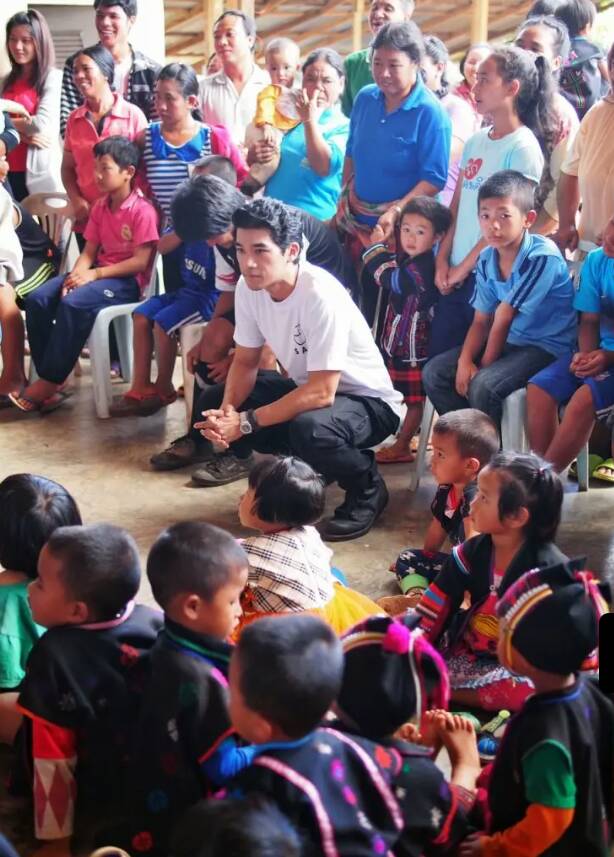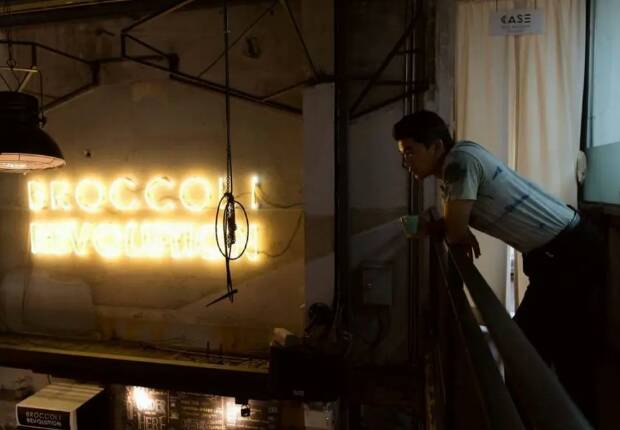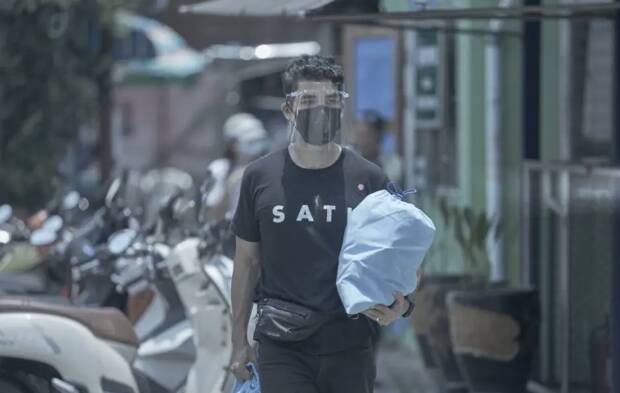Icon NOW: Sakson Rouypirom on Empowering Communities Beyond Charity
Icon NOW: Sakson Rouypirom on Empowering Communities Beyond Charity
วันที่นำเข้าข้อมูล 10 Nov 2021
วันที่ปรับปรุงข้อมูล 30 Nov 2022
Icon NOW: Sakson Rouypirom on Empowering Communities Beyond Charity
What’s in an icon? As part of Thailand NOW’s mission to share authentic insights into all things Thai, we’re spotlighting iconic individuals who have not only excelled in their respective areas, but influenced the complex tapestry of Thailand as it exists today and, in doing so, inspire us to be a part of the fabric of Thai society.
In this Icon NOW interview, philanthropist Sakson Rouypirom shares his early experiences growing up in the United States, building the SATI ecosystem in Thailand, and his philosophy on empathy and empowerment.

Some days, Sakson Rouypirom might be spotted meditating with a group of teens. Other days, you might find him distributing food rations at various communities across the city. Running in circles in Bangkok and across Thailand, back and forth, here and there, it might be hard to pinpoint what exactly Sakson’s job is.
Founder and director of SATI Foundation, co-owner of Broccoli Revolution, and co-founder of Na Projects and COVID Relief Bangkok, Sakson spends most of his days finding ways he can help. Born and raised in the United States, this pursuit began when he was younger, regularly volunteering at hospitals, in schools, on the streets, and in the field. Early on, he knew that he wanted to study medicine.
“I figured, occupation-wise, I wanted to go into a field where I felt like I could help people,” Sakson says, “but that’s the old school way of thinking.”
Interested in the study of people and their interactions, he attended New York University to study psychology. During this time, he also began exploring Eastern philosophy and delving into the realm of Buddhism. Much of the lectures sounded familiar—growing up, his mother had always passed onto him the religion’s fundamental teachings, as well as other pieces of Thai culture and values.

Intrigued, Sakson immediately returned to Thailand upon graduation to ordain as a monk at a temple situated in the forests of northeastern Thailand. There, he experienced for himself what his classes and his mother had been speaking of—such as values of mindfulness and compassion—through scriptures and meditation practices.
In 2011, just as he had completed his monkhood, Thailand was hit by the most devastating flood in its history. Sakson found himself volunteering with hospitals and disaster relief groups in Bangkok and, amid the crisis, chanced on the right time to build the non-profit he had long dreamt of.
After returning to complete his graduate studies in the U.S., he came home to Thailand with the same intention to help—though still not quite sure how. He began with his first project in Chiang Rai, providing aid to a community faced with drug abuse, malnutrition and a multitude of other challenges.
“I realised, if I was the best doctor in the world, how many people would I be able to help? Maybe five or six,” Sakson explains. “But if I can develop a system, I could help hundreds or thousands a day.”

In 2012, SATI Foundation was established with an aim to help improve healthcare and education for underserved communities and youth across Thailand. Sati means ‘mindfulness’ in Pali and Thai and—along with its circular logo—speaks to the guiding principles Sakson has laid out for the non-profit: profound understanding of both the problems and solutions, their cyclical patterns and interactions, as well as the bigger picture of our actions and their impacts towards our surroundings and vice versa.
“The system that we’ve created is a system of handouts. If you’re born on a mountain and every year, someone comes and gives you blankets and food, you’re not going to succeed in life, because you’ve already been taught that you’re nothing,” Sakson says. “So every time I go, I have to tell them that they have the responsibility to make their life better.”
From his previous experience working at various non-profits, he knew he wanted a different model which didn’t rely on a culture of pity and charity, but rather one oriented towards empathy and empowerment. Whether it’s helping provide clean drinking water to an underserved community in Mae Hong Son, or conducting art therapy with at-risk teens in Bangkok, SATI’s support always comes with an activity that can further the youth’s potential in the long run.

Beyond the conventional treatment, his focus shifted to prevention. What can you do to save children before they end up at the emergency room, in jail, or on the streets? Sakson believes it starts from changing their environment.
“If you grew up in the slums of Klong Toey and everyone sells drugs, you don’t think you can do anything but sell drugs,” he explains. “We want to open up choices to them, whether it’s being a chef or an artist or a dancer.”
Each week, SATI runs workshops with youths and runaways involved in drugs, prostitution, and other complications to help them explore alternatives to their current situation and disposition. With volunteers from various fields, the kids learn skills like photography, cosmetics, writing, meditation, Muay Thai, music, rapping, beatboxing, and more to show them their potential or undiscovered passions.
“Everyone needs to have the freedom to choose first.”
Through positive reinforcement, SATI helps youth develop their self-esteem and enjoyment of a variety of new hobbies which help them focus on present contentment instead of returning to past pain, taking on a new school of trauma therapy. Ra no ther than trying to create happiness for the youths, SATI focuses on reducing their suffering and ensuring their basic needs such as food, healthcare, and education.
Rooted in advice given by one of Sakson’s phra ajarn (senior monk), the Foundation’s solutions are based on an understanding of the natural human tendency for one to assume, judge, and measure others’ satisfactions based on their own perceptions and biases.
“My job is not to tell them what’s right or wrong,” Sakson says. “Everyone needs to have the freedom to choose first. Whether they choose it or not, that’s up to them.”

His other platforms, including vegan restaurant Broccoli Revolution, creative social space CASE Space Revolution, and Na Café, serve as an all-encompassing ecosystem for which he can circulate resources within to help communities more efficiently and quickly.
Whether it’s creating employment, generating income, providing venues for classes, or raising awareness, each place bridges together each area of Sakson’s work in a holistic approach to building a healthy community, while also inviting other Bangkokians to get involved.
“Everyday I’m just solving a different problem,” Sakson says. “I just need to see what the biggest problem that day is.”

Like other problems, to Sakson, the COVID-19 pandemic presented another hurdle he was determined to help resolve. In March 2020—in collaboration with Scholars of Sustenance and Urban Studies Lab, with support from Bangkok 1899 and Thai Health Volunteers Foundation, in partnership with the Community Organization Development Institute—SATI established the COVID Relief Bangkok coalition to provide aid to vulnerable communities across the city.
“Some of these problems have always been around, but they’ve just been [highlighted] during the pandemic,” Sakson says.
With the help of public contributions, they conducted demographics research to identify and locate populations most in need of masks, sanitisers, food, and other essentials to relieve some of the burden on Thailand’s healthcare sector.
For the long term, they are also creating a network of experts and volunteers to provide mental health support, establishing a community finance system, and providing entrepreneur training to help local communities cope and small business ventures survive.
“Things are falling apart, so that means it’s a good time to build,” Sakson says. “After it’s all over, are we going to go back to normal or are we going to build back something better?”

Throughout the pandemic, Sakson took the opportunity to work more closely with underserved communities in Bangkok, such as in “poor pockets” and juvenile detention centres.
With information gathered from the tremendous amount of groundwork they do, he is now exploring the potential for SATI to serve as a data resource for child drug abuse, social media influence, and other areas of social development. Recently, they’ve also piloted a learning program for runaway youths, which offers them accredited placement in the country’s education system.
“I’m okay with trying to fix problems,” Sakson says. “It’s just a part of life.”
As its model remains ever-changing, Sakson hopes that SATI can share such multi-pronged strategies of mindfulness and healthcare to youth and communities in other countries. Inspired by the kids he works with and learns from each day, he is determined to continue offering a hand to enable people to help themselves. Hopefully, one day, they can also pass it along and widen this circle of compassion.
สถานเอกอัครราชทูต ณ กรุงเตหะราน
Office Hours: Sunday to Thursday, 08:30-12:00 and 13:00-16:30 (Except public holidays)